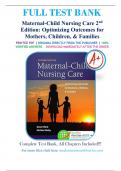FULL TEST BANK
Maternal-Child Nursing Care 2nd
Edition: Optimizing Outcomes for
Mothers, Children, & Families
PRINTED PDF | ORIGINAL DIRECTLY FROM THE PUBLISHER | 100%
VERIFIED ANSWERS | DOWNLOAD IMMEDIATELY AFTER THE ORDER
Complete Test Bank, All Chapters Included!!!
For more files click here: medconnoisseurlibraries.com
,Description
Test Bank for Maternal-Child Nursing Care with The Women’s Health Companion:
Optimizing Outcomes for Mothers, Children, and Families, 2nd Edition, Susan L. Ward,
Shelton M. Hisley, ISBN-13: 978-0-8036-3665-1, ISBN-10: 0803636652, ISBN-13:
9780803636651
Maternal-Child Care Nursing, 2nd Edition
I. Foundations in Maternal, Family, and Child Care
1. Traditional and Community Nursing Care for Women, Families, and Children
2. Contemporary Issues in Women’s, Families’, and Children’s Health Care
3. The Evolving Family
4. Caring for Women, Families, and Children Across the Life Span
II. The Process of Human Reproduction
5. Reproductive Anatomy and Physiology
6. Human Sexuality and Fertility
7. Conception and Development of the Embryo and Fetus
III. The Prenatal Journey
8. Physiological and Psychosocial Changes During Pregnancy
9. The Prenatal Assessment
10. Promoting a Health Pregnancy
11. Caring for the Woman Experiencing Complications During Pregnancy
IV. The Birth Experience
12. The Process of Labor and Birth
13. Promoting Patient Comfort During Labor and Birth
14. Caring for the Woman Experiencing Complications During Labor and Birth
,V. Care of the New Family
15. Caring for the Postpartal Woman and Her Family
16. Caring for the Woman Experiencing Complications During Postpartal Period
17. Physiological Transition of the Newborn
18. Caring for the Normal Newborn
19. Caring for the Newborn at Risk
VI. Caring for the Child and Family
20. Caring for the Developing Child
21. Caring for the Child in the Hospital, the Community and Across Care Settings
22. Caring for the Child with a Psychosocial or Cognitive Condition
VII. Ongoing Care of the Child in the Hospital and in the Community
23. Caring for the Child with a Respiratory Condition
24. Caring for the Child with a Gastrointestinal Condition
25. Caring for the Child with an Immunologic or Infectious Condition
26. Caring for the Child with a Cardiovascular Condition
27. Caring for the Child with an Endocrinologic or Metabolic Condition
28. Caring for the Child with a Neurological or Sensory Condition
29. Caring for the Child with a Musculoskeletal Condition
30. Caring for the Child with an Integumentary Condition
31. Caring for the Child with a Genitourinary Condition
32. Caring for the Child with a Hematological Condition
33. Caring for the Child with Cancer
34. Caring for the Child with a Chronic Condition or the Dying Child
35. Caring for the Critically Ill Child
, Chapter 1: Traditional and Community Nursing Care for Women, Families, and
Children
MULTIPLE CHOICE
1. The clinic nurse understands the new description of nursing art/aesthetics as the way that
nurses and patients help each other through a circular process. What is the event that begins
this process?
A. A health threat
B. Experiencing new possibilities for health
C. Hope and understanding for the future
D. Relationship building
ANS: A
Nursing aesthetics consists of the low-tech, high-touch caring in a nurse–patient encounter.
This transformative process begins with a health threat. The event that begins the process is
not experiencing new possibilities for health, hope and understanding for the future, or
relationship building.
Cognitive Level: Knowledge/Remembering
Content Area: Pediatrics/Maternity
Patient Needs: Safe and Effective Care Environment: Management of Care
Integrated Process: Caring
Difficulty: Moderate
PTS: 1
2. A nurse manager in a community clinic is concerned because the local refugee population
does not seek health care routinely. What action by the nurse would be most helpful?
A. Assess clinic staff and procedures for evidence of ethnocentrism.
B. Put up flyers advertising the clinic’s services in local retailers.
C. Reward preventative health patients with coupons for needed items.
D. Try to meet with community leaders to work on the problem.
ANS: A
Ethnocentrism is the view that the beliefs, values, and behaviors of one culture are superior to
those of other cultures. Ethnocentrism is dangerous in health care because it is blind to the
possibilities of other solutions and viewpoints and alienates people in need of health care. The
nurse manager would be wise to assess the clinic’s staff and procedures for ethnocentrism.
Meeting with a community leader is always a good idea to learn the viewpoints of the
community, but unless ethnocentric behaviors change, it is unlikely that the refugee
community will increase its use of the clinic. Flyers and incentives may also be helpful in
some cases, but not as helpful as reducing the barriers imposed by ethnocentrism.
Cognitive Level: Application/Applying
Content Area: Pediatrics/Maternity
Patient Needs: Health Promotion and Maintenance
Integrated Process: Caring
Difficulty: Moderate




